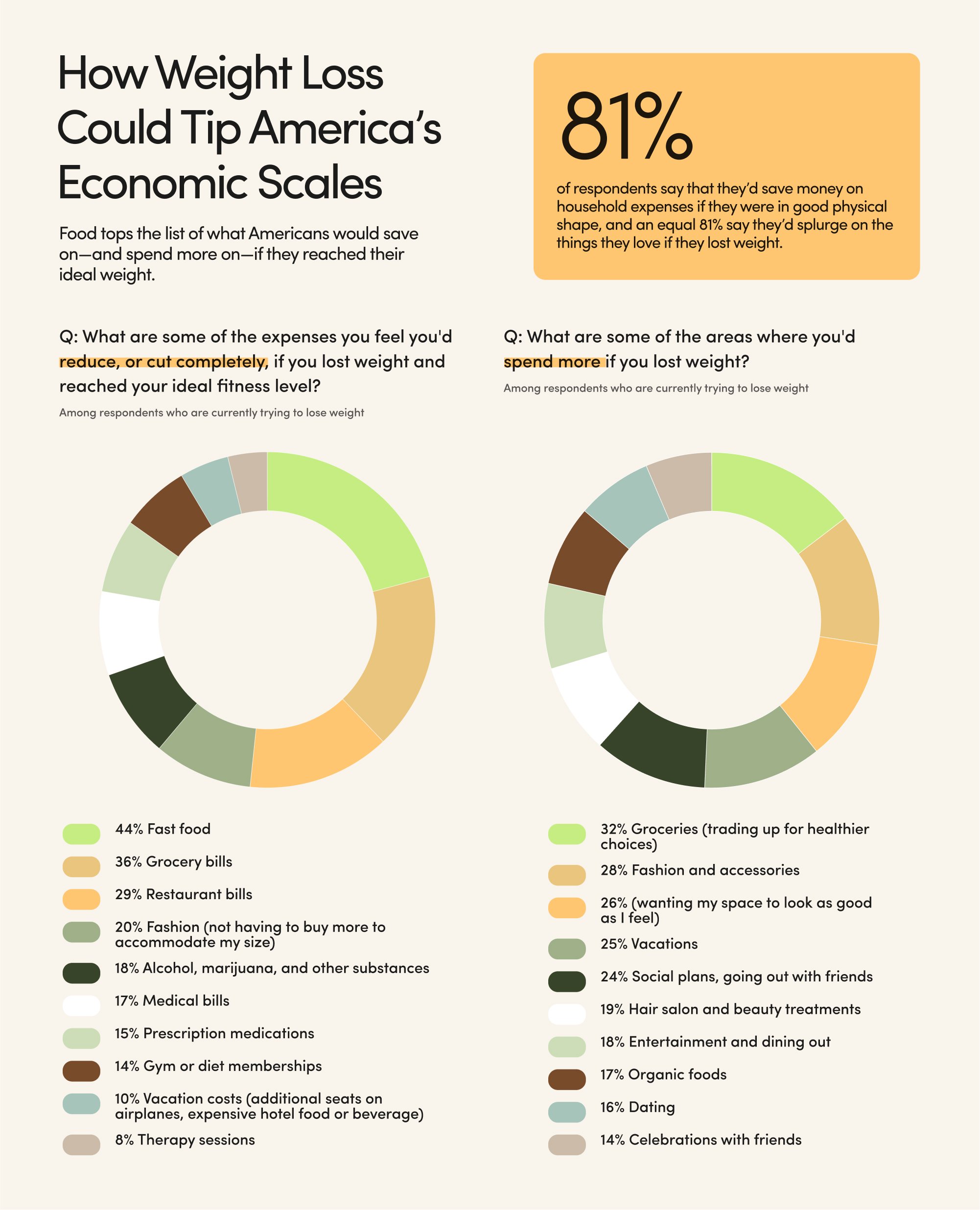How weight loss could tip America's economic scales

Gutesa // Shutterstock
How weight loss could tip America’s economic scales
While it may not seem obvious at first, the obesity epidemic and economics have a direct connection to each other, especially when it comes to spending categories like healthcare, food, and fitness.
One study places annual healthcare costs related to obesity at $173 billion. But the rise of weight loss medications could shift these economic trends. The use of semaglutide as treatment for obesity has skyrocketed over the last five years, which could mean major changes in how people spend and save.
Weight loss can impact day-to-day personal spending, as well, including how much people are spending on food, fitness, and even things like therapy and entertainment, Hims reports. A 2024 study from Hims & Hers, The Shape of America, revealed exactly how Americans would adjust their spending if they reached their goal weight. Some industries could see a strong decline, while others could benefit from the shift.
How Americans View Spending and Weight
Americans largely believe that losing weight can make a big difference both in daily life and in the country as a whole. In fact, 89% of surveyed Americans said that weight loss could have a positive impact on society, with longer lives and lower healthcare costs as the two biggest outcomes cited in the study.
And 26% of respondents believe the economy would improve thanks to better productivity, which may not be surprising since nearly 1 in 10 survey respondents reported missing a day of work because of how they felt about their weight.
According to the Center for Disease Control (CDC), a missed day of work due to illness or injury costs an employer around $1,685 per employee, which could account for $278 billion in the U.S. economy.
But respondents also reported that their own personal finances would improve if they could successfully lose weight. 81% said they would save on household expenses, and an equal 81% said they’d splurge on things they love if they lost weight. Respondents who identified as overweight said they would save $6,210 a year if they reached their ideal weight but would also spend $5,520 more in other areas.
There were some clear swaps envisioned, such as spending less on fast food and more on organic foods; needing fewer doctor visits and having more time for being social; and scheduling fewer therapy sessions but shopping for more clothes and accessories. In other words, people would spend less on necessities (that become less needed) and more on the things that bring them joy and enhance their lives.
How Americans Spending Habits Would Change After Weight Loss
Here’s a full look at what Americans would spend less and more on if they lost weight.
Things Americans Would Spend Less On After Weight Loss
When asked, “What are some of the expenses you feel you’d reduce, or cut completely, if you lost weight and reached your ideal fitness level?” respondents who are currently trying to lose weight reported the following.
- 44% Fast food
- 36% Grocery bills
- 29% Restaurant bills
- 20% Fashion (not having to buy more to accommodate my size)
- 18% Alcohol, marijuana, and other substances
- 17% Medical bills
- 15% Prescription medications
- 14% Gym or diet memberships
- 10% Vacation costs (additional seats on airplanes, expensive hotel food or beverage)
- 8% Therapy sessions
- 7% Wellness retreats
- 4% Fertility treatments
Things Americans Would Spend More On After Weight Loss
When asked, “What are some of the areas where you’d spend more if you lost weight?” respondents who are currently trying to lose weight reported the following.
- 32% Groceries (trading up for healthier choices)
- 28% Fashion and accessories
- 26% My home (wanting my space to look as good as I feel)
- 25% Vacations
- 24% Social plans, going out with friends
- 19% Hair salon and beauty treatments
- 18% Entertainment and dining out
- 17% Organic foods
- 16% Dating
- 14% Celebrations with friends
![]()

Hims
What Weight-Loss Related Spending Shifts Could Mean for Affected Industries
As long-term weight loss becomes more of a reality for many Americans, it’s clear that they’re envisioning lifestyle and mental health shifts as major benefits. Research indicates that psychological well-being is likely to improve alongside weight loss, with the biggest change being an increase in vitality.
The Hims & Hers study findings support that. While respondents would plan to spend less on food overall, they envision themselves making healthier purchases at the grocery store. And instead of feeling hindered by size options for fashion and paying more for larger sizes, they would spend on clothing and accessories they really love and that would work for going on vacation or socializing with friends.
These data points also signal potential changes for the industries associated with these purchase areas. If the study results presage actual spending shifts, some industries, like grocery stores, fashion retailers, and hair salons, could financially benefit. On the other hand, fitness memberships, healthcare facilities, and therapists, for instance, are all areas in which people would prefer to spend less.
3 Tips For Starting a Weight Loss Journey
Even with the rise of weight loss medication, it takes ongoing work and motivation to commit to healthy lifestyle changes. If you’re on a weight loss journey or thinking about starting one, follow these tips to stay committed. As you get closer to your goal weight, you may find yourself thinking about shifting some of those financial priorities to align with your newfound goals.
- Identify your purpose: There are many reasons someone may choose to lose weight, but it’s important to find your own reason to stick with it. Maybe you want to have more energy throughout the day, reduce anxiety, or mitigate some health issues like prediabetes, sleep apnea, or hypertension. Make your own personal mission statement on why you’re working on losing weight and create affirmations around those thoughts to keep them at the forefront of your mind.
- Get an accountability partner: Research shows that accountability plays a key role in successfully losing weight. Whether you have a daily group chat with friends or join an online group, find a safe place where people want to hear you brag about your morning workout and share photos of hitting your daily protein goal.
- Track (and celebrate) your progress: As you work on losing weight and improving your health, track your daily wins. It can be frustrating to only rely on the scale for motivation, especially when it’s common to have weight loss plateaus. Instead, track habits you have control over, like hitting a daily exercise target, getting good sleep, making a good food choice, or getting in some extra steps. Choose a method that appeals to you, whether it’s writing it out in a journal or downloading a health tracking app.
Losing weight and prioritizing spending habits are closely intertwined. As more Americans lean into weight loss goals, both with and without medication, we’ll continue to see how purchasing decisions shift alongside a healthier population.
This story was produced by Hims and reviewed and distributed by Stacker.
